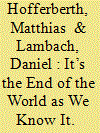|
|
|
Sort Order |
|
|
|
Items / Page
|
|
|
|
|
|
|
| Srl | Item |
| 1 |
ID:
164455


|
|
|
|
|
| Summary/Abstract |
By championing certain actors over others, International Relations (IR) theory conventionally avoids questions of agency and does not, at least in theoretical terms, discuss which entities can develop capacities needed to act in world politics. Whether it is states, institutions, or individuals, we simply “locate” agency in particular entities, which then exist and act as global governors qua definition. In other words, agency is determined by a priori claims and we rarely reflect the dispositions needed to be(come) an actor in the first place. Even global governance, despite its impetus to consider agency beyond the state, has not engaged in such a discussion, at least not in theoretical terms. In order to initiate such a discussion, the paper draws on the distinction between substantialism and relationalism. After reviewing how agency has been framed in IR, the paper outlines three general dispositions of agency and relates those to the two ontological perspectives. Based on this theorization, the paper contents that IR's lack of reflection and its substantialized notions of agency, whether in rationalist or constructivist appearance, remain problematic. As such, there is potential to conceptualize agency in world politics not as an inherent disposition of entities but rather as emerging from social relations between them. Such a framework compels researchers to not just assume discrete actors but to focus on relational processes through which their agency emerges in the first place and sustains over time. Reconstructing these processes reveals their political nature and allows us to consider who should govern the world.
|
|
|
|
|
|
|
|
|
|
|
|
|
|
|
|
| 2 |
ID:
175397


|
|
|
|
|
| Summary/Abstract |
This article contends that practices of, and reflections on, global governance are diversifying without any particular teleology. Therefore, it proposes a “postgovernance” perspective to capture and make sense of the multiplicity of concurrent developments. Just like post-punk followed punk rock and provided new energy, postgovernance provides opportunities to revitalize debates on world politics. Postgovernance allows both scholars and practitioners to consider the persistence of “traditional” forms of global governance as well as the simultaneous emergence of new approaches. This article thus proposes postgovernance as a mode of world politics in a postparadigmatic world that is dynamic yet inconsistent. We advance this argument by outlining what postgovernance entails, by taking stock of current debates from a postgovernance perspective, and by discussing how these can be advanced from a postgovernance point of view.
|
|
|
|
|
|
|
|
|
|
|
|
|
|
|
|
| 3 |
ID:
141206


|
|
|
|
|
| Summary/Abstract |
Ever since global governance was introduced to the discipline of International Relations (IR), it has been criticised for its conceptual vagueness and ambiguity. In fact, how to even speak and think global governance – whether as a mere description of world politics, as a theoretical perspective to explain it, or as a normative notion to be realised through global policy – remains unclear. The article argues that this confusion exists not because of a lack of debate but rather because of the multiple understandings of global governance that are continuously advanced and implicitly reproduced within these debates. These different, partially overlapping and partially contradicting understandings constitute global governance as a ‘floating signifier’. It is argued that precisely because of this, global governance has obtained its ‘celebrity status’ within and beyond IR. Advancing a singular definition of global governance thus appears to be an arbitrary exercise as well as unnecessary disciplining. Rather than reducing global governance to a singular meaning, the debate in and of global governance would benefit from more self-reflected awareness as to when and how different concepts and understandings of it are invoked. To provide a framework for this, the article structures the different meanings of global governance by offering a taxonomy of different global governance applications.
|
|
|
|
|
|
|
|
|
|
|
|
|
|
|
|
|
|
|
|
|